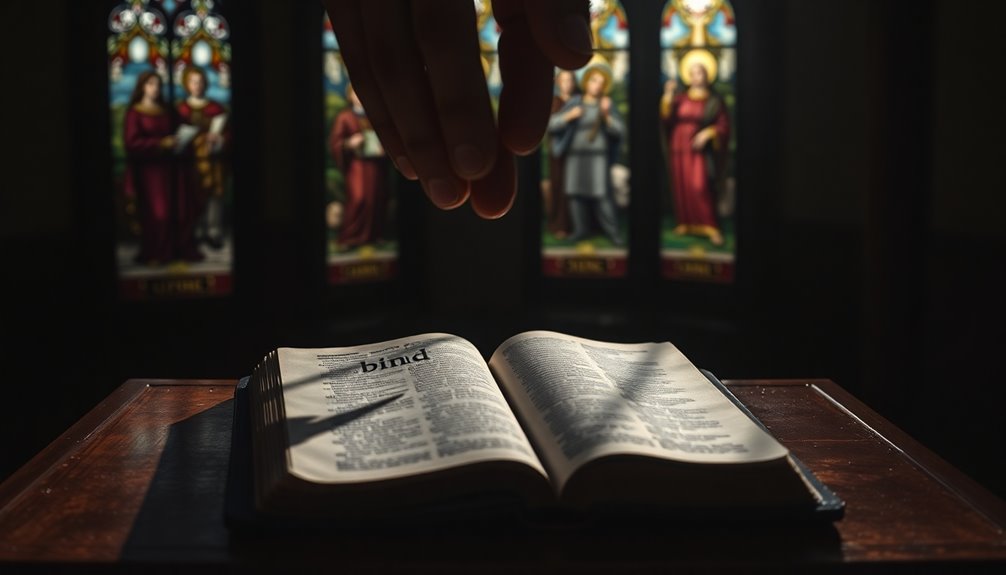In the Bible, "bind" refers to the authority within the church to prohibit certain actions and uphold moral standards. This concept, rooted in scriptures like Matthew 16:19 and 18:18, highlights the power given to apostles and disciples in guiding community behavior. It reflects a shared responsibility in church leadership, unlike a top-down structure. The practice draws on Jewish legal traditions, underscoring the importance of communal consensus. While binding can involve discipline, it's meant for guidance and not domination. Understanding this deeper can really shed light on its significant role in today's church dynamics.
Key Takeaways
- In the Bible, "bind" refers to prohibiting specific actions or behaviors to maintain moral standards within the community.
- The authority to bind, as seen in Matthew 16:19, emphasizes the church's role in establishing ethical guidelines.
- Binding is connected to Jewish legal traditions, where leaders exercised authority to interpret and enforce the law.
- Church discipline involves binding, providing corrective measures for those straying from community standards, aligning with God's will.
- Misinterpretation of binding can lead to legalism, highlighting the importance of understanding authority as a collective responsibility within the church.
Introduction

Understanding the concept of "binding" in the Bible is crucial for grasping its implications within the church and community. The term "bind" often refers to prohibiting certain actions or behaviors, particularly in the context of church discipline.
You'll find references to this authority in passages like Matthew 16:19 and 18:18, where it's clear that the apostles received the power to bind and loose, mirroring the obligations imposed by Jewish legal traditions.
This idea of binding reflects not just a simple prohibition but a framework for maintaining moral and ethical standards within the church. When someone in the community strays from these standards, the authority to bind comes into play, allowing for corrective actions that uphold the integrity of the church.
For instance, Paul's disciplinary measures in 1 Corinthians 5 regarding sexual immorality serve as a compelling example of how binding operates within the church discipline framework.
Ultimately, understanding binding is key to recognizing the balance of authority and accountability within your community, ensuring that the decisions made align with divine endorsement and the broader mission of the church.
Biblical Context of Authority

When exploring the biblical context of authority, you'll notice key references, like Matthew 16:19 and 18:18, that highlight the power given to the apostles and all disciples.
These passages show how authority isn't just a top-down structure but a shared responsibility within the church.
Understanding these scriptures helps clarify how decisions align with God's will and maintain order in the community.
Primary Bible References
The concept of binding and loosing, central to the authority granted to Peter and the apostles, emerges prominently in Matthew 16:19 and Matthew 18:18. In these verses, Jesus empowers Peter with the keys of the kingdom of heaven, highlighting the significance of this authority within the New Testament. Binding refers to prohibiting certain actions or behaviors, while loosing signifies permitting them. This dual role reflects a judicial authority rooted in Jewish law and tradition.
Matthew 16:19 illustrates Peter's unique position in declaring what's permitted or forbidden within the church. It's not just about rules; it's about aligning earthly decisions with divine will.
Similarly, in Matthew 18:18, Jesus extends this authority to all the apostles, emphasizing the collective responsibility of the church in maintaining moral and spiritual integrity.
Further, Acts 15 showcases this authority in action as the apostles navigate the inclusion of Gentiles in the church. Their decisions reflect the heavenly decrees intended by Christ.
Ultimately, this binding and loosing authority serves to uphold Christ's sovereignty, ensuring that the church acts in accordance with His will, thereby maintaining a divine connection in its governance.
Secondary Bible References
Building on the authority outlined in Matthew 16:19 and 18:18, it's important to explore how other scripture references further clarify this concept of binding and loosing within the context of biblical authority.
The New Testament illustrates that when the apostles bind on earth, they prohibit certain behaviors, and when they loose, they allow or forgive actions. This reflects their unique role in establishing the moral framework of the church.
Acts 15 serves as a pivotal example, showcasing the apostles' legislative power as they determined the terms for Gentile believers' acceptance. Their decisions, rooted in Jewish traditions of binding and loosing, were aimed at maintaining unity and purity within the community.
It's essential to recognize that the authority to bind and loose was primarily given to the apostles and doesn't extend beyond them, as indicated by the New Testament.
This framework emphasizes that whatever you loose on earth will be loosed in the kingdom of heaven, linking the church's decisions directly to divine affirmation.
Understanding these secondary references helps reinforce the significance of apostolic authority in guiding the early church and shaping its practices.
Jewish Legal Traditions' Influence

While exploring the meaning of "bind" in biblical contexts, it's essential to consider the influence of Jewish legal traditions. In these traditions, binding and loosing represent the authority of rabbinic leaders to prohibit or permit behaviors based on their interpretations of the Torah. Historically, this authority was exercised by poseks within the Sanhedrin, establishing a structured system of judicial decision-making.
Two main schools of thought, Shammai and Hillel, showcased different applications of binding and loosing. Shammai leaned towards stricter interpretations (binding), while Hillel favored more lenient approaches (loosing). Talmudic texts, such as Makkot 23b, highlight that earthly judgments made by these authorities carry divine sanction, reinforcing their decisions' connection to spiritual authority.
When Christ transferred this binding and loosing authority to the apostles, it marked a significant shift in governance. This transition laid the groundwork for a new ecclesiastical framework, which would guide church discipline and moral decisions within the early Christian community.
Cultural Significance of Authority

Understanding the authority to bind and loose offers insight into its cultural significance within both Jewish and early Christian contexts.
In Jewish culture, this authority was traditionally held by poseks, scholars empowered to interpret and apply Jewish law. The differing approaches of the Shammai and Hillel schools highlight a cultural debate over authority in legal matters, with each school embodying unique perspectives on binding (forbidding) and loosing (permitting) actions.
The Sanhedrin, the Jewish council, exemplified the practical application of this authority, making judicial decisions that carried significant weight.
This authority was later echoed in the power given to the apostles by Christ, emphasizing its importance in the early Christian community.
The cultural significance of binding and loosing was profound, as these actions were seen as not only earthly decisions but also as reflective of divine approval.
This connection bridged human authority with heavenly sanction, establishing leaders as vital in maintaining moral order. Their guidance was essential for shaping spiritual and ethical conduct among believers, reinforcing the critical role of authority in both Jewish and early Christian traditions.
Misunderstanding Authority in Context

When you think about the authority to bind and loose, it's easy to fall into common misconceptions.
Many misinterpret church authority, assuming it's solely in the hands of leaders, when in fact, it's a collective responsibility of all disciples.
Understanding this context is crucial to avoid legalism and ensure actions align with God's will rather than personal agendas.
Debunk Common Misconceptions
Many people misinterpret the authority to bind and loose in the Bible, especially regarding church leaders. They often think this power gives leaders the right to create their own rules, but that's not accurate. The concept of binding and loosing, found in Matthew 16:19 and 18:18, is meant to uphold God's will as revealed in Scripture, not to impose personal or institutional preferences.
This authority is closely tied to the apostles' role in maintaining church order and discipline. It doesn't grant unilateral power over believers' spiritual lives. Many assume that all church leaders throughout history possess this authority, but the New Testament indicates it was specific to the apostolic office and ceased with the last apostle's death.
Furthermore, there's a misconception that church discipline can be arbitrary. In fact, the process of binding (excommunication) and loosing (restoration) is outlined in Matthew 18:16-20, emphasizing a structured approach grounded in Scripture and community accountability.
Understanding these nuances will help you appreciate the true purpose of binding and loosing, ensuring that authority aligns with God's established moral framework.
Misinterpretation of Church Authority
Misinterpretation of church authority can create significant confusion within the faith community. When you misunderstand the concept of binding and loosing, it's easy to think church leaders have unchecked power over individual believers. This belief disregards Christ's ultimate authority. The binding and loosing authority, rooted in Jewish tradition, should align with God's will and Scripture, not personal whims.
If you misinterpret Matthew 18:18, you might see church discipline as punitive rather than redemptive. This misuse can undermine the integrity of your church community, leading to fear instead of growth. Remember, the authority given to apostles and church leaders is meant for guidance and order, not for domination. It emphasizes accountability and divine approval instead.
Confusion about the relationship between earthly and heavenly authority can hinder effective church governance. You may find leaders making decisions without seeking the Holy Spirit's guidance, risking disobedience to divine principles.
It's essential to grasp the biblical intent behind church authority, so you can foster a community that reflects Christ's love, grace, and truth. Recognizing the proper context can help you navigate authority with wisdom and discernment.
Everyday Decision-Making Guidance

When you're faced with daily choices, understanding the concepts of binding and loosing can really guide your actions.
These principles help you navigate your responsibilities and make decisions that align with both your personal values and the needs of your community.
Daily Choices and Responsibilities
Everyday decisions shape our lives and reflect our values, making it essential to align them with God's will. As you navigate daily choices, consider the principles of binding and loosing. These concepts guide you in making decisions that either prohibit harmful behaviors or permit actions that reflect God's grace.
When faced with dilemmas, seek the Holy Spirit's guidance to discern which choices are binding—those that should be avoided—and which are loosing—those that can be embraced.
Understanding the authority of church discipline, as highlighted in Matthew 18:18, can also help you take responsibility for your actions and their impact on your community.
Each decision made has the potential to either uplift or harm those around you, reinforcing the importance of acting with integrity.
Community Leadership and Decision-Making
Effective community leadership within the church hinges on the principles of binding and loosing, which provide a framework for decision-making that aligns with biblical teachings. This authority, rooted in apostolic tradition, guides you and other leaders in maintaining order and moral integrity within the congregation.
In everyday decision-making, you're called to seek the Holy Spirit's guidance, ensuring your actions reflect divine approval and align with God's will.
When addressing conflicts or implementing church discipline, Matthew 18:16-20 offers crucial criteria. It emphasizes the necessity of community consensus and scriptural adherence. By involving the congregation in discussions, you foster a sense of shared responsibility and unity.
Remember, the decisions you make aren't just administrative—they're reflections of heavenly decrees. You bear the weight of this authority, so it's vital to uphold biblical standards while considering the spiritual welfare of your community.
Each decision should promote growth, healing, and restoration, rooted in love and understanding. By adhering to these principles, you can guide your church effectively, ensuring that each choice aligns with the values of the Gospel and strengthens the community's bond in Christ.
Authority's Practical Implications Today

While the authority to bind and loose in the church may seem like an ancient practice, it's deeply relevant to how church leaders guide their communities today. This concept, rooted in Matthew 16:19 and Matthew 18:18, highlights the importance of church discipline and the moral integrity of the Christian community.
Church leaders wield the authority to bind, which can involve actions like excommunication for serious offenses, ensuring that the church maintains its moral standards. Conversely, loosing provides a pathway for forgiveness and reconciliation for those who genuinely repent.
Today, church governance reflects these teachings, emphasizing adherence to scriptural principles rather than merely following man-made rules. Leaders are called to seek the Holy Spirit's guidance in exercising their authority, ensuring their decisions align with God's will.
The process of church discipline, as outlined in Matthew 18:16-20, remains essential. It offers a biblical framework to address conflicts, promote accountability, and foster restoration among members.
Additional Resources

Exploring additional resources can deepen your understanding of the binding and loosing concepts in the Bible. To grasp these principles fully, consider delving into the Jewish Encyclopedia. This resource provides essential insights into the historical and cultural context of binding, illustrating its roots in Jewish legal traditions and the authority it conveys within community governance.
Additionally, various theological texts can enrich your perspective on church discipline, as outlined in Matthew 18:16-20. These texts often discuss how binding and loosing aren't just abstract concepts but practical applications of authority within the church.
Reflecting on the New Testament's emphasis that the apostles' actions were aligned with God's will can help you appreciate the seriousness of these principles.
You might also explore commentaries on Matthew 16:19 and Matthew 18:18, which clarify how these passages relate to the exercise of authority and church discipline. By engaging with these resources, you'll gain a more profound understanding of how binding and loosing function within a community of faith, allowing you to apply these concepts thoughtfully in your own life and church settings.
Frequently Asked Questions
What Does Binds Mean in the Bible?
When you explore the term "bind," you're looking at a concept that involves creating restrictions or prohibitions.
It often relates to imposing certain behaviors or actions, reflecting authority. In a community context, binding can mean making decisions that impact moral or spiritual conduct.
You might think of it as enforcing rules that align with a higher moral standard, emphasizing the importance of accountability and discipline within a group or organization.
What Does It Mean to Bind Spiritually?
To bind spiritually means you declare certain actions or influences as forbidden, using prayer and biblical authority.
When you bind something, you're exercising the power given to you as a believer to impact the spiritual realm. This can involve addressing harmful behaviors or demonic forces, ensuring they've no hold over you or your community.
Ultimately, it's about aligning your earthly decisions with divine approval and maintaining spiritual integrity within your life.
What Does It Mean in the Bible to Bind and Loose?
When you think about binding and loosing in the Bible, you're looking at concepts of authority and moral decisions.
Binding often means prohibiting certain actions, while loosing allows for permission or release from obligations. This reflects the responsibility of leaders to maintain order and discipline within the community.
Essentially, what you bind on earth connects to what's recognized in heaven, emphasizing the serious nature of these spiritual decisions and their consequences.
What Is Bind on Earth in the Bible?
When you read "bind on earth" in the Bible, it signifies the authority given to church leaders to declare certain actions or behaviors as prohibited.
This concept emphasizes the responsibility you have to uphold moral standards within your community.
It connects your decisions to divine authority, reflecting a commitment to God's will.
Essentially, you're tasked with maintaining order and integrity, acting in accordance with the guidance of the Holy Spirit.










